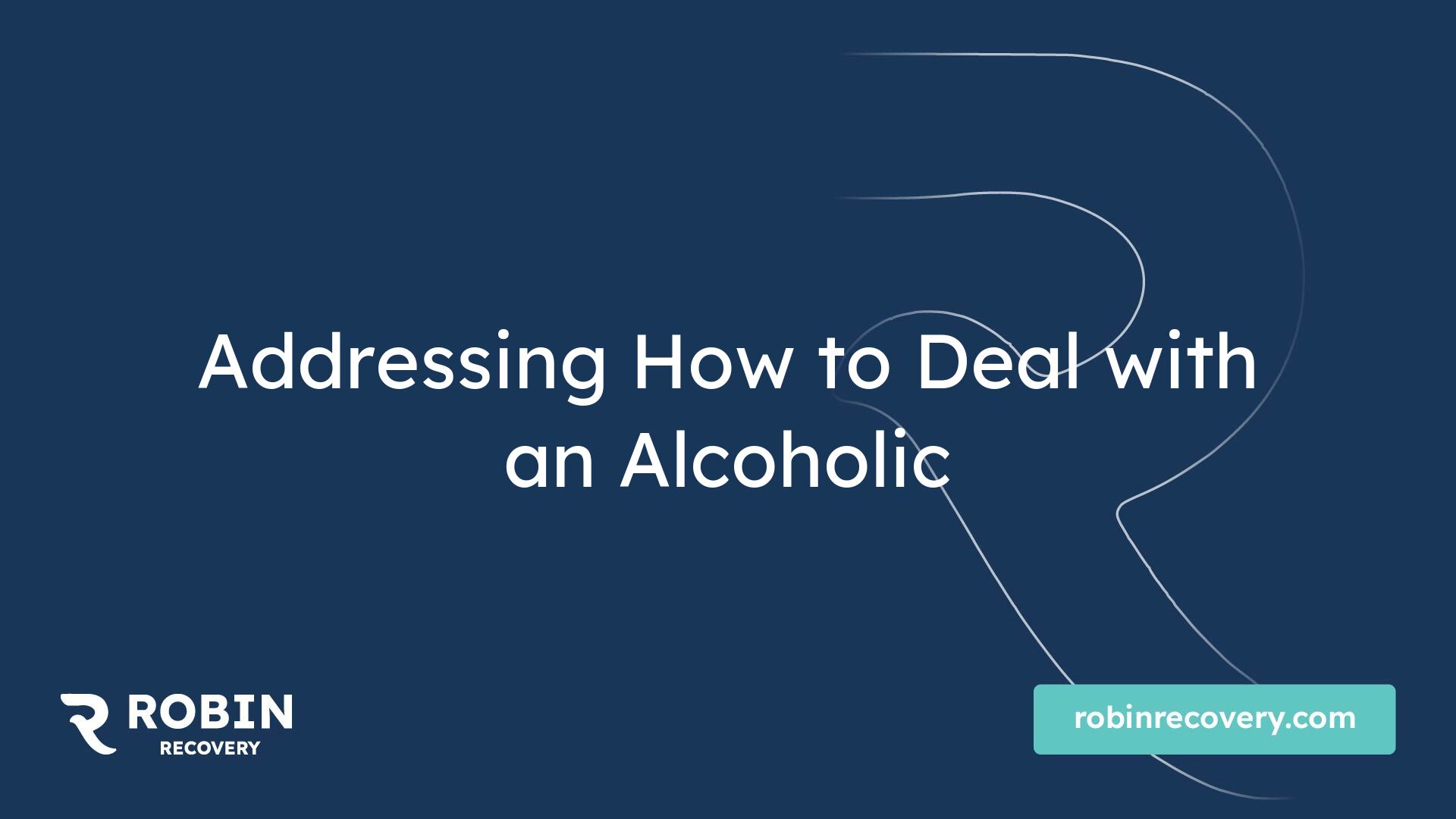Addressing How to Deal with an Alcoholic

Supporting a Loved One
Supporting a loved one dealing with alcohol dependence can be challenging yet crucial. Providing proper guidance can significantly impact their journey toward recovery. Here, we explore two fundamental aspects of support: encouraging professional help and setting healthy boundaries.

Encouraging Professional Help
One of the most effective ways to assist someone struggling with alcohol use disorder is by encouraging them to seek professional help. This could range from therapy to medical treatment. An intervention can serve as a motivating force for someone to consider seeking help for their alcohol misuse. Engaging experts in this process can enhance its effectiveness and provide the individual with the necessary support.
Setting Healthy Boundaries
Setting healthy boundaries is essential in supporting a loved one during their recovery from addiction. This approach involves giving them space to focus on their treatment while trusting professionals to manage their care.
Some critical strategies for establishing appropriate boundaries include:
Additionally, support groups can be an invaluable resource for friends and family members of those seeking help. These groups offer emotional support, coping strategies, and shared experiences during the recovery process [2].
When assisting a loved one struggling with addiction, implementing these strategies can significantly contribute to a more supportive environment conducive to recovery. For further insights, explore tips for straightening curly hair to enhance understanding and approach.
Understanding Alcohol Use Disorder

Recognizing the signs and symptoms of alcohol use disorder (AUD) is essential in understanding how to deal with an alcoholic. Early intervention can lead to more effective treatment and support for those affected.
Signs and Symptoms
Alcohol use disorder is characterized by an impaired ability to control drinking or stop drinking, resulting in health, social, and professional problems. The symptoms can be both psychological and physical, and recognizing them early is crucial for initiating a recovery journey. Below is a table summarizing common signs and symptoms of alcohol use disorder.
Signs and SymptomsDescriptionInability to cut down or stopDifficulty in reducing alcohol consumption, even when attempts are made.CravingA strong desire to drink, often leading to excessive consumption.Withdrawal symptomsPhysical symptoms such as nausea, sweating, or shakes when not drinking.ToleranceNeeding to drink more over time to achieve the same effects.Neglecting responsibilitiesFailing to fulfill obligations at work, school, or home.
Tools like the CAGE questionnaire and the Alcohol Use Disorders Identification Test (AUDIT) can help assess if someone has alcohol use disorder. Answering 'yes' to two or more questions on the CAGE questionnaire may indicate a drinking problem.
Behavioral Changes
Behavioral changes are often significant indicators of alcohol misuse. These manifestations can be seen in relationships, work, and home life, stemming from the negative impact of alcohol on brain function and behavior. Some common behavioral changes include:
These changes highlight the need for intervention and treatment and can impact everyday life significantly.
Understanding these signs and symptoms is vital for anyone looking to support a loved one struggling with alcohol use disorder. Recognition and early action can pave the way for effective treatment and recovery strategies, aiding in the process of dealing with an alcoholic.
Interventions and Treatment
Addressing an alcohol use disorder can be challenging. Proper planning and intervention can significantly increase the likelihood of a loved one accepting help.
Planning an Intervention
A successful intervention must be planned carefully to ensure it is effective. Poorly executed interventions can lead to feelings of resentment in the individual struggling with alcohol, making them more resistant to treatment. Key elements of a well-planned intervention include:
Creating a supportive and understanding atmosphere is crucial for the success of the intervention and can help the individual feel less attacked.
Seeking Professional Help
Professional assistance is often beneficial when dealing with an alcoholic. Guidance from trained professionals can help navigate the complexities of addiction. Various resources are available for those needing support:
Engaging in these resources can facilitate healthier coping strategies, essential for long-term recovery. Additionally, supporting recovery can involve avoiding triggers and encouraging participation in aftercare programs, such as counseling or group meetings [6].
Utilizing these methods can significantly improve the chances of recovery for someone struggling with alcohol use disorder while also supporting those around them. For more strategies on the broader spectrum of addiction support, consider reviewing related topics.
Resources for Support
Finding the right support can be crucial when learning how to deal with an alcoholic. Various resources can provide assistance and emotional aid, both for individuals struggling with alcohol use disorder and their loved ones. This section will explore two main resources: support groups and helplines/hotlines.
Support Groups
Support groups can be vital resources for friends and family members of individuals seeking treatment for addiction. These groups offer assistance and coping mechanisms throughout the recovery journey. One notable option is SMART Recovery™, a support network designed for individuals dealing with various types of addiction. SMART Recovery™ focuses on helping individuals overcome alcoholism and maintain sobriety through its 4-Point Program, promoting a balanced life.
Another important organization is Women for Sobriety, which is dedicated to supporting women struggling with alcohol dependency. The organization employs the Thirteen Statement Program to assist women in achieving and maintaining abstinence [7].
Support GroupFocus AreaDescriptionSMART Recovery™General Addiction4-Point Program for overcoming addiction and maintaining sobrietyWomen for SobrietyWomenSupport groups and self-help tools for women dealing with alcoholism
These groups not only provide practical strategies but also foster a supportive community where individuals can share their experiences, feelings, and successes with others who understand their struggles.
Helplines and Hotlines
In addition to support groups, helplines and hotlines can offer immediate assistance and guidance for those in crisis. They provide a confidential and safe space for individuals seeking help or needing someone to talk to. Many organizations offer 24/7 helplines staffed by trained professionals who can provide valuable resources or direct individuals to local support services.
Useful hotlines include:
Hotline NameContact NumberPurposeNational Alcohol Abuse Hotline1-800-ALCOHOL (1-800-252-6465)Assistance for individuals struggling with alcoholismSubstance Abuse and Mental Health Services Administration (SAMHSA)1-800-662-HELP (1-800-662-4357)24/7 treatment referral and information service
These hotlines are essential resources for anyone wanting to discuss their challenges related to alcohol use or those looking for information on available treatment options. They can help initiate important conversations and guide individuals toward getting the help they need.
For more assistance, families and friends may also benefit from understanding coping strategies and providing substance-free activities to individuals in recovery. Engaging in healthy and fun alternatives can help strengthen the recovery process while promoting a richer quality of life.
Recovery and Aftercare
Recovery from alcoholism is a challenging journey that requires consistent effort and support. Two critical components of maintaining sobriety are avoiding triggers and engaging in aftercare programs.
Avoiding Triggers
Avoiding triggers is essential for individuals recovering from alcohol use disorder. Triggers are situations, places, or people that may prompt a craving for alcohol or lead to relapses. To support a loved one in their recovery, it is important to foster an environment that minimizes exposure to these triggers.
Common triggers may include:
Trigger TypeExamplesSocial SituationsParties, bars, or gatherings where alcohol is presentEmotional StatesStress, depression, boredom, or lonelinessEnvironmental CuesPlaces associated with past drinking, such as favorite drinking spots
Encouraging the individual to engage in substance-free activities can help them learn to enjoy life without the influence of alcohol. This might include participating in hobbies, exercising, or exploring new interests. By creating new experiences, they can establish a rewarding life that does not depend on alcohol.
Engaging in Aftercare Programs
Aftercare programs are designed to provide ongoing support and resources to individuals in recovery from alcohol use disorder. These programs are often crucial in preventing relapse. Various types of aftercare programs include counseling sessions, support groups, and family therapy.
Some popular aftercare options are:
Aftercare TypeDescriptionCounselingIndividual or group therapy to discuss challenges and coping strategiesSupport GroupsPrograms such as Alcoholics Anonymous (AA), which provide a community of understanding individuals who share experiences and encouragement (Alcohol Help)Family TherapyInvolves family members in the recovery process to strengthen relationships and improve communication
Engagement in these programs offers individuals the tools to cope with stress, develop healthy routines, and maintain a supportive network of peers and loved ones. It's essential that individuals feel comfortable discussing their struggles and celebrating their successes during this phase of recovery. This support can foster a sense of accountability and provide reassurance that they are not alone in their journey [8].
References
[2]:
[3]:
[4]:
[5]:
[6]:
[7]:
[8]:
